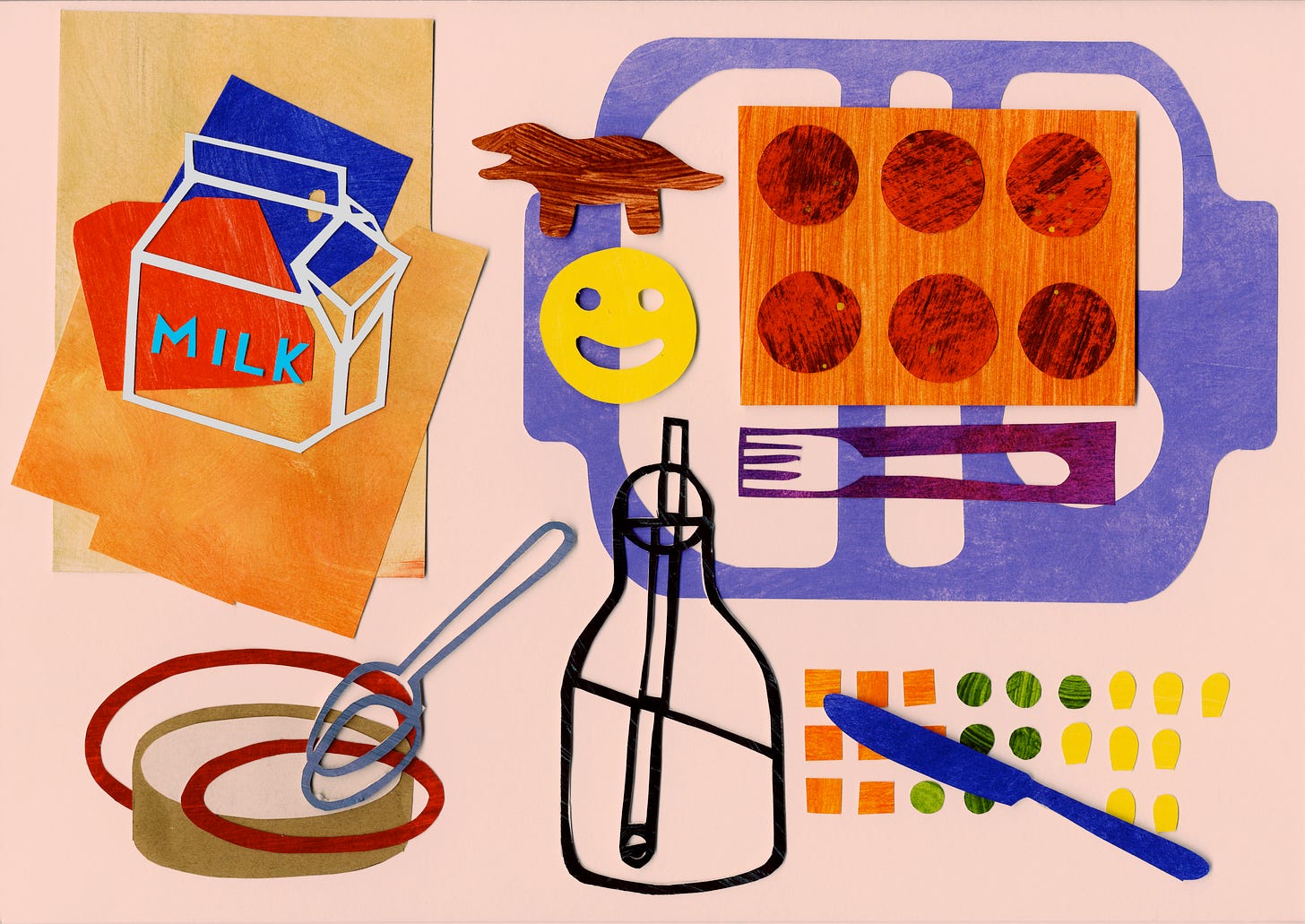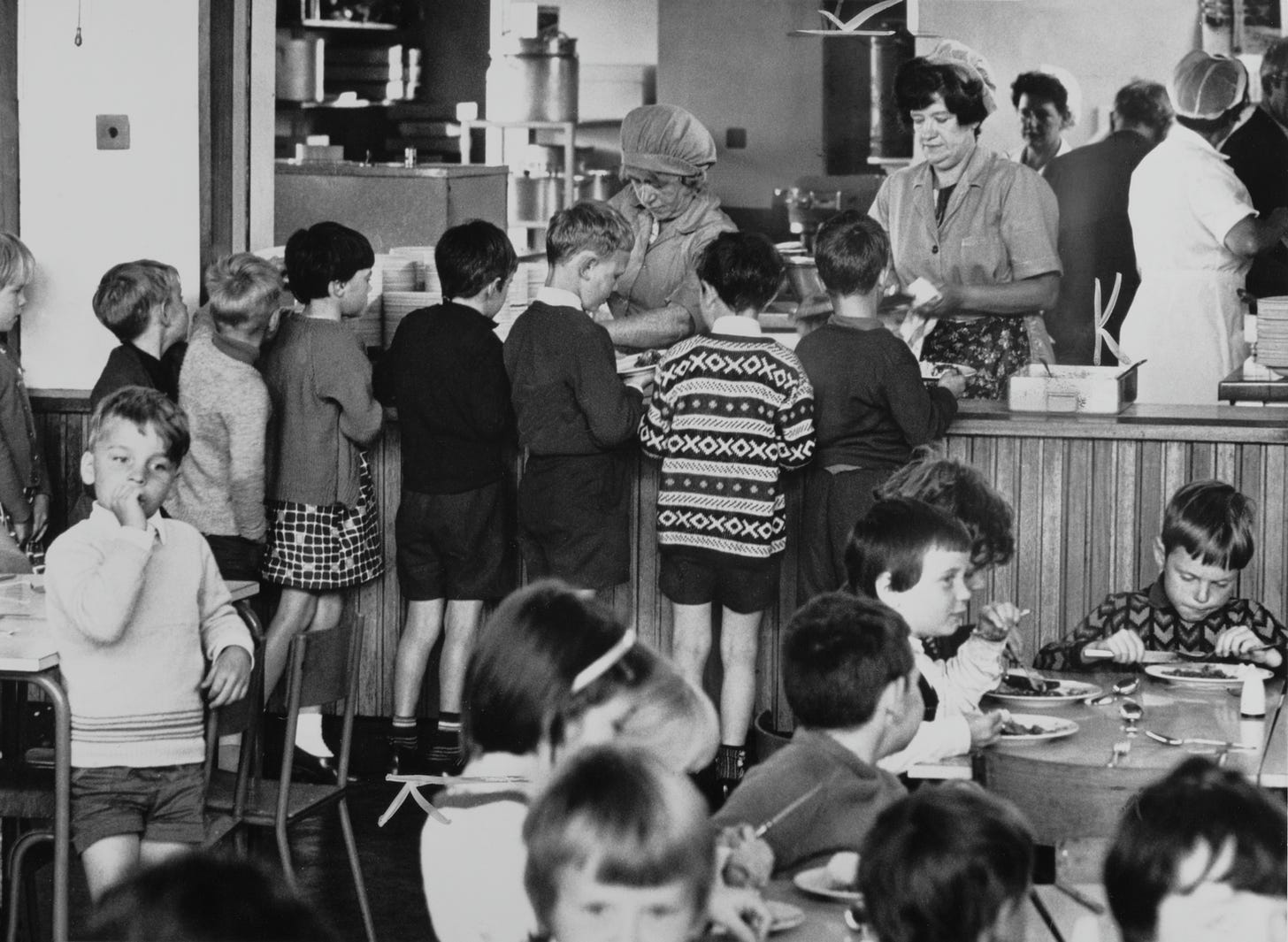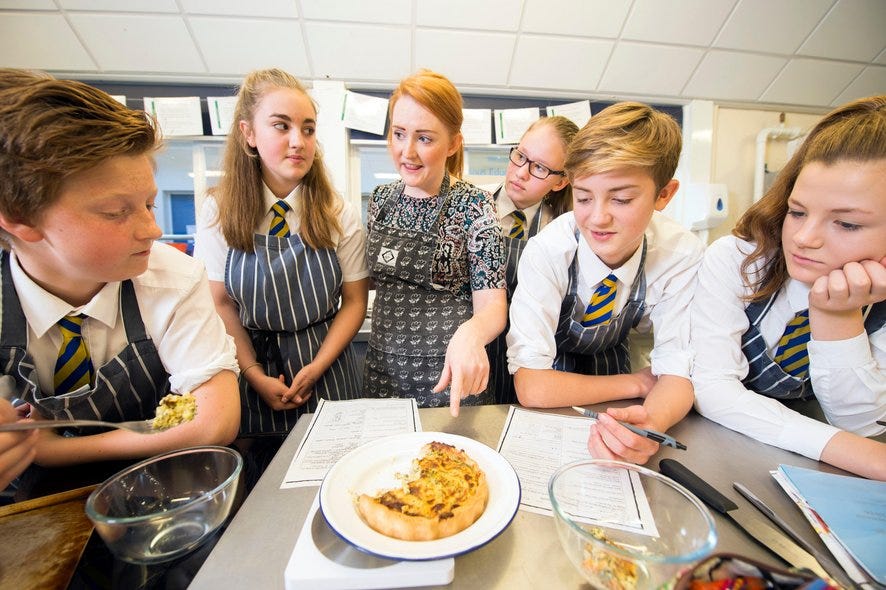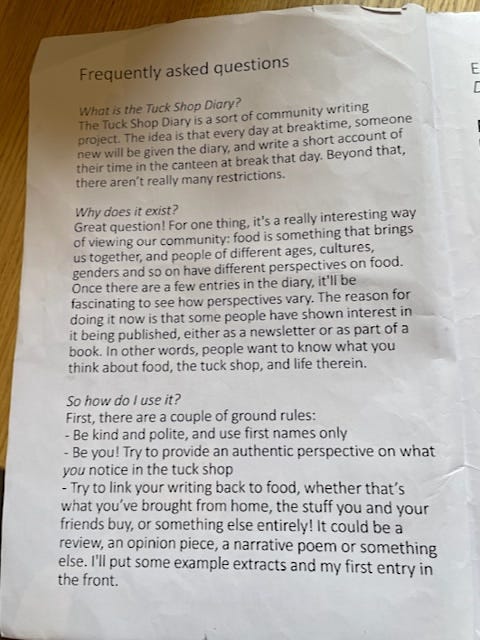Tuck in, it's Schools Week!
A century of school dinners, a chat with a dinner lady, food education, student views on lunch.
Good morning and welcome to Vittles Season 7: Food and Policy. Each essay in this season investigates how a single or set of policies intersects with eating, cooking and life.
This week’s newsletter is a special package made up of four essays and conversations interrogating how policy affects what children eat at schools, and the role of various governments in shaping children’s food education, nutrition and pleasure. The articles can be found below and on our website, and can be read in your own time.
School Lunches: the Last 120 Years
A Chat With a Dinner Lady
Why is Food Education so Unappetising
The Tuck Shop Diary
All of Season 7 is free to read, but you can subscribe for £5/month or £45/year, which gives you access to our whole back catalogue and ensures all writers are paid fairly. Thank you so much for your support!
Tuck in, it's Schools Week!
The food we eat at school is formative, shaping appetites and aversions that endure through adulthood into old age, as well as providing essential nourishment when bodies and brains are growing fastest. I still remember how our canteen gave us chocolate milk for pudding only twice during the seven years I was at primary school. I spent every other lunchtime there waiting for chocolate milk to appear again, which led to a life-long obsession with chocolate milkshake. Anyone who has grown up in Britain during the last few decades will have their own memories of industrial school dinners. Personally, I was less keen on the balls of unseasoned mashed potato (rumoured to be powdered), meat pies (at a time when the BSE crisis was at its peak) and spam. Nonetheless, we had to do our best to convince the dinner ladies on patrol that we had eaten enough before we could leave the table.
As a society, we should care profoundly about the food we serve children at school – especially at a moment when food poverty is at critical levels. According to The Food Foundation, in January 2023, 21.6% of households with children reported that their children had directly experienced food insecurity in the past month, affecting an estimated 3.7 million children – up from 11.6% in January 2022. And as the pieces in this week’s series show, you can draw a portrait of every political epoch that the United Kingdom has been through over the past century through its attitudes to and investment in feeding children at school and educating them about how to cook — from the creation of the welfare state, through to Thatcher’s dismantling of it, and the sticking plasters of New Labour.
For schools week, Lexi Earl looks at how school dinners have changed in Britain over the last 120 years, from the late 19th century era of porridge, dripping and bone broth, through to Roast Dinner Wednesdays and Turkey Twizzlers. Katie Randall interviews one of the people on the front line of feeding children, a dinner lady (or as they’re now known, midday assistants) to talk about how the job has changed and what policies schools have to adhere to when feeding their pupils. Laura Thomas interrogates how packed lunches are shrinking due to a misguided policy on 100 calorie snacks. Thea Everett looks back at the history of the subject known as ‘Food Technology’ and formerly called ‘Home Economics’, and why teaching children about food has always been such a low priority for both governments and schools. And finally Will Yates lets the people who are most affected by school dinner policy — actual school children — tell us their relationship with food and the canteen in their own words. RMJ
School Lunches: the Last 120 Years
From nourishing soldiers of empire, to the founding of the welfare state and its subsequent decline: a century in school dinners. Words by Lexi Earl.
A Chat with a Dinner Lady
A conversation with a midday assistant by Katie Randall, and a guide to school dinner policy by Katie Randall and Laura Thomas.
Why Is Food Education So Unappetizing?
Subject to endless rebrands, why has food education has struggled to gain real legitimacy in British schools? Words by Thea Everett.
The Tuck Shop Diary
School dinners in children’s words. Scenes from morning break, written and compiled by Will Yates.
I ran down the stairs running through a huge angry crowd praying the lunch line wasn’t long. My prayers were answered as it unbelievably took 30 seconds for me to be let in. As I went in and explored my options, I couldn’t make up my mind on what to get. I was wondering should I have my usual Halal chicken burger or try something new, the cous cous and chicken wrap. I knew I had to make up my mind quick before one of the ladies would shout the usual ‘hurry up’. I asked a fellow friend and he said why don’t you try something new, so I chose the cous cous rap. I wasn’t happy with the amount of chicken I was given, it was a little amount, although the wrap was delightful and succulent for £1.80. I would give this wrap a solid 7.5 out of 10, could’ve been a 9 if I had more chicken. Ismail, Year 10
Credits
Lexi Earl is a writer and science communicator, currently managing the Oxford Martin Programme on the Future of Food. She is the author of Schools and Food Education in the 21st Century (Routledge, 2018) and, with Pat Thomson, Why Garden in Schools? (Routledge, 2021). Lexi is interested in the way we feed children, the different actors involved, and how our feeding practices are shaped by policies, the media, social media, families, tradition and knowledge. She writes a newsletter on Substack: nature//nuture.
Laura Thomas is a Registered Nutritionist who writes the Can I Have Another Snack? newsletter where she helps people feel less afraid of feeding themselves and their families.
Katie Randall is a writer from London interested in how class, food and culture intersect. You can find more of her food writing on Paste Magazine and Hawkker.
Thea Everett runs a recipe Substack called What’s That You’re Cooking, Thea?, and is a deputy editor at delicious. magazine.
Will Yates is a former secondary school English teacher now working in public affairs. You can find his writing on his website or on Twitter and bad photos of his food on Instagram.
Thank you to our anonymous dinner lady and school children for their contributions.
Sinjin Li is the moniker of Sing Yun Lee, an illustrator and graphic designer based in Essex. Sing uses the character of Sinjin Li to explore ideas found in science fiction, fantasy and folklore. They like to incorporate elements of this thinking in their commissioned work, creating illustrations and designs for subject matter including cultural heritage and belief, food and poetry among many other themes. Previous clients include Vittles, Hachette UK, Welbeck Publishing, Good Beer Hunting and the London Science Fiction Research Community. They can be found at www.sinjinli.com and on Instagram at @sinjin_li
Vittles is edited by Sharanya Deepak, Rebecca May Johnson and Jonathan Nunn, and proofed and subedited by Sophie Whitehead.








When my son was seven his end of year report had a space underneath the headteacher and form tutor's comments for him to write about his goals for the next academic year. His reply? 'Have seconds at lunch more often'. They photocopied it and bluetacked it to the school kitchen wall. Back then the lunches were fully cooked in-house. That's no longer the case.
In a little moment of coincidental anticipation, my Instagram post last week (@thecookeryclub25, see picture of Miss Fritton), predicted the way in which a national food society might use the subject of school food in all its aspects.
My Instagram account exists for the sole purpose of gathering interest in and support for a foodlovers’ society akin the the Royal Horticultural Society (600,000 members).